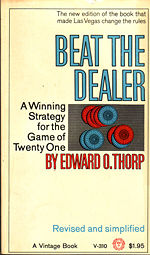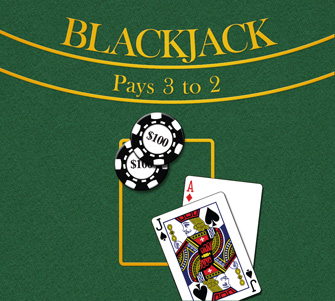Beat The Dealer by Edward O. Thorp
Beat The Dealer: A Winning Strategy For The Game of Twenty One
I have an older copy of Beat The Dealer: A Winning Strategy For The Game of Twenty One. I know it's an older copy, because it touts itself on the cover as having sold over 500,000 copies. And when I took a look at the book for sale on Amazon, I could see that the cover now reads "Over 1,000,000 copies sold". And I don't doubt that number one bit, as Beat The Dealer is THE groundbreaking work when it comes to counting cards and understanding the game of blackjack. My copy of the book also reads "The book that made Las Vegas change the rules" across the top of it. Unlike most of the crap ebooks' claims that are being sold on the Internet, this book's claim is also true.
 Beat The Dealer was first published in 1962. And before the publication of Beat The Dealer, card counting was practically unheard of. So when people refer to Edward O. Thorp's book as the book "that started it all", they're not exaggerating. In fact, this book is so important, such a giant in the blackjack literature, that I'm a little intimidated about writing a review of it at all. But review it I will.
Beat The Dealer was first published in 1962. And before the publication of Beat The Dealer, card counting was practically unheard of. So when people refer to Edward O. Thorp's book as the book "that started it all", they're not exaggerating. In fact, this book is so important, such a giant in the blackjack literature, that I'm a little intimidated about writing a review of it at all. But review it I will.
Beat The Dealer is written in a pretty old-fashioned style. If you've read some of the older self-help books like Dale Carnegie's books, then you'll be familiar with the writing style. This isn't a criticism, just an observation. The writing style is dated, and will sound a little bit funny to modern readers. That's no big deal, and it's certainly not a reason to avoid reading the book.
A nice aspect of that particular writing style is the detailed table of contents. Not only are the chapters listed, but what's covered in each chapter is also presented in the table of contents. When I took education classes in college, we learned about meta-reading, and one of the elements of meta-reading that helped people learn was a detailed overview or table of contents.
An example from the table of contents for Beat The Dealer follows:
2. The Rules of Blackjack
Numbers of players. The pack. The deal. Betting. Numerical value of the cards, hard and soft hands. Object of the player. Naturals. The draw. The settlement. Splitting pairs. Doubling down. Insurance. Customs and practices: Shuffling, Shills, New decks.
As you can see, you know what you're going to learn from each chapter.
Beat The Dealer goes on to explain basic strategy in some detail in the next chapter, then discusses how to come up with a winning strategy in the following chapter. These explanations of why basic strategy is essential to use in a blackjack game and why blackjack can be beaten by a card counting system are as good as anything written in any newer blackjack book. The first three chapters of Beat The Dealer will give any aspiring blackjack expert an excellent conceptual foundation from which to start.
The counting system presented in Beat The Dealer is more difficult than most modern count systems, but it provides interesting reading nonetheless. And Edward O. Thorp's anecdotes and tales of his blackjack success are inspirational and gripping. The book also features a section on dealing with casino's countermeasures, which also seems a bit dated, and some information about dealing with cheating. I've noticed that a lot of the earlier blackjack literature, including this book and Lance Humble's The World's Greatest Blackjack Book worry a lot about the possibility of a casino cheating the player. My thinking is that cheating by the casino is no longer the concern for blackjack players that it once was. Casinos now just offer really bad games like 6/5 blackjack, or they use a large number of decks and shuffle them often, or they use automatic shufflers when they deal. Cheating isn't necessary when you have those countermeasures in place.
Beat The Dealer is an indispensible book in any serious blackjack student's library though. The historical significance of the book and the excellent conceptual framework that it provides makes it well worth the cover price and then some. Follow it up with Kevin Blackwood's book, or some of Stanford Wong's books, and you'll be in a good position to become an expert blackjack player and/or card counter, if that's your goal.
See also:
- The Kelly Criterion
- 6-5 Blackjack
- Traits of Winning Blackjack Players
- Card Counting Software
- Millionaire Casino Download
- Blackjack Sites Ordered By Traffic
- Card Counting in Blackjack
- Free Online Blackjack
- Blackjack Weaknesses
- Learning New Blackjack Skills
- Ryan Board Interview
- Bad Ideas in Blackjack
- Pro Blackjack Tips
- Blackjack Decision Making


 CasinoMax
CasinoMax


